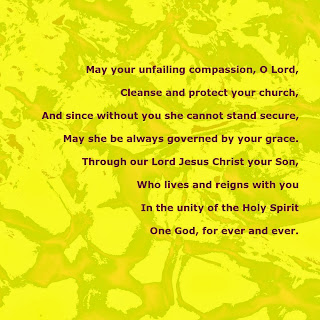And all this is from God, who has reconciled us to himself through Christ and given us the ministry of reconciliation, namely, God was reconciling the world to himself in Christ, not counting their trespasses against them and entrusting to us the message of reconciliation. So we are ambassadors for Christ, as if God were appealing through us.
When I visited Ireland in 1990, I stayed in a Franciscan parish. The pastor invited me to preside at Mass and give the homily. I reminded the congregation that, a hundred-and-fifty years ago, they had sent young men and women to America as missionaries. The United States was largely Protestant at the time and Irish Catholics were not welcome. They were subject to discrimination, harassment and riots but they made themselves indispensable in the armed forces, the police, the Church and city governments. Today everyone counts themselves Irish on March 17! As a descendant of Irish immigrants I thanked the Catholic congregation for their sacrifice.
If Ireland was a land of blessings for the world, what is the United States today when American white nationalism foments terrorist acts around the world, recently in New Zealand. There is a virtual army of cowards in the US which breeds craven champions. They appoint themselves to start a race war with the slaughter of defenseless men and women. Bigotry spawns cowardice which leads to murder.
If, at one time, Catholics sought to prove our patriotism in the face of nationalism, today we must prove our loyalty to Christ in the face of racism, sexism, clericalism, drug abuse, suicide, abortion and gun violence. We must protest with the innocent Tamar,
"This is not done in Israel. Do not commit these terrible crimes."Our protest begins with our presence. We are here; we are here to stay. We love the Lord and make daily sacrifices. We are not ashamed of our faith in Jesus Christ and our love of the Church, though we do experience shame in the presence of hatred. We are here to reconcile the world to God in Christ. Whenever a despairing soul asks, "Where is God in this wicked place?" we must answer, "Here I am." We are the physical presence of God.
Today's gospel of the Prodigal Son should inspire our willingness to forgive. The father in the story may have acted foolishly in handing his wastrel son his share of the inheritance but God our Father has also given the human race more freedom than we can handle. Without the discipline of the Holy Spirit we create only more violence. Clearly, we have wasted and continue to waste our lives, our opportunities and our very Earth.
The faithful must be the first to turn back to the Lord. We dare not wait for someone else to go first. Lent demands sacrifice of us. It reminds us of the sacrifice we must make daily throughout the year, but it reminds us "Now is the acceptable time."
This parable also reminds us of our willingness to begin again. The older brother represents the righteous who never left the Church and his decision, at the end of story, is pending. If we fail, the Earth will be wasted and we will not be saved.
As a woman about to give birth writhes and cries out in pain, so were we before you, LORD. We conceived and writhed in pain, giving birth only to wind; Salvation we have not achieved for the earth, no inhabitants for the world were born.
But your dead shall live, their corpses shall rise! Awake and sing, you who lie in the dust! For your dew is a dew of light, and you cause the land of shades to give birth. Go, my people, enter your chambers, and close the doors behind you; Hide yourselves for a brief moment, until the wrath is past. See, the LORD goes forth from his place, to punish the wickedness of the earth’s inhabitants; The earth will reveal the blood shed upon it, and no longer conceal the slain. Isaiah 26:17-21












